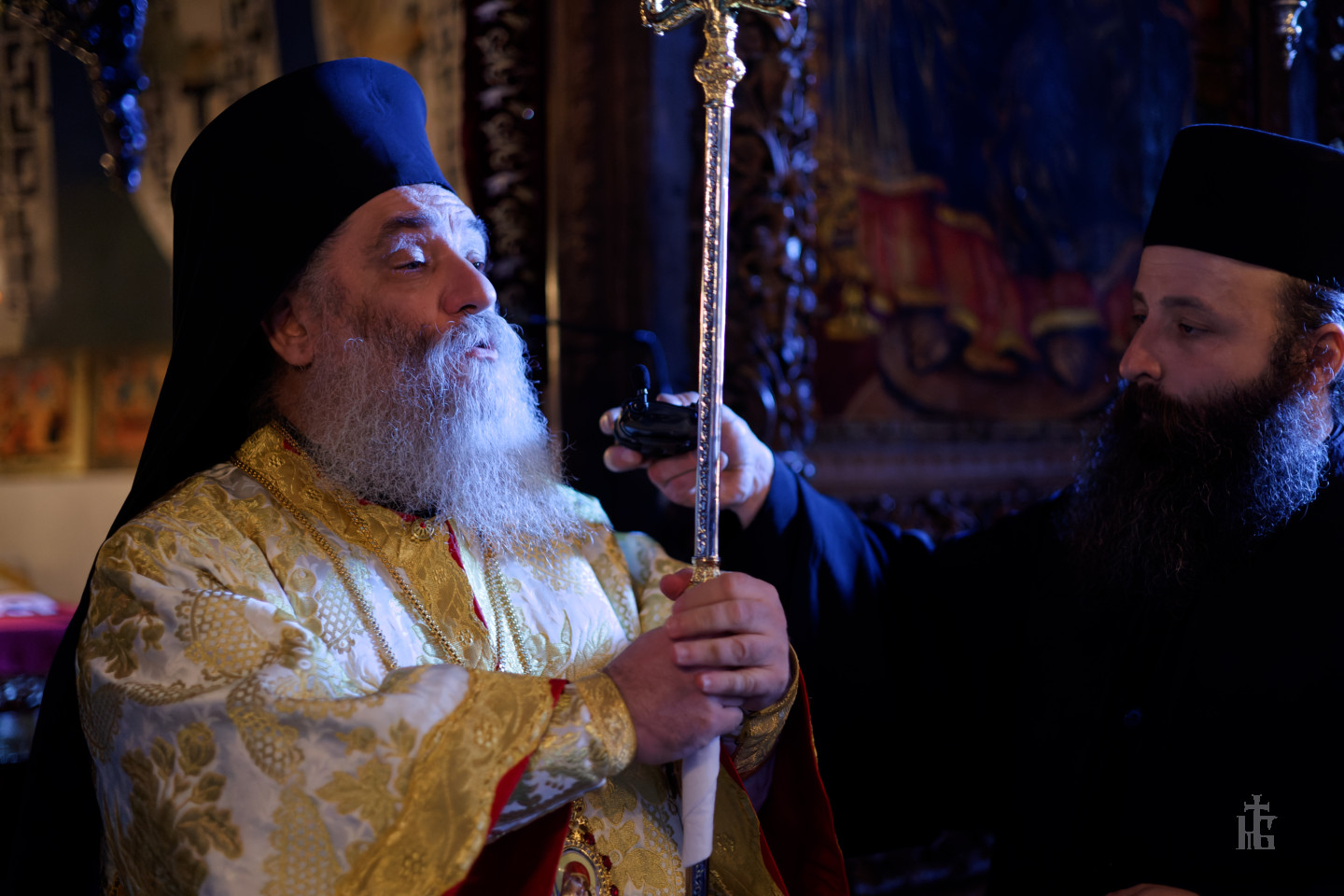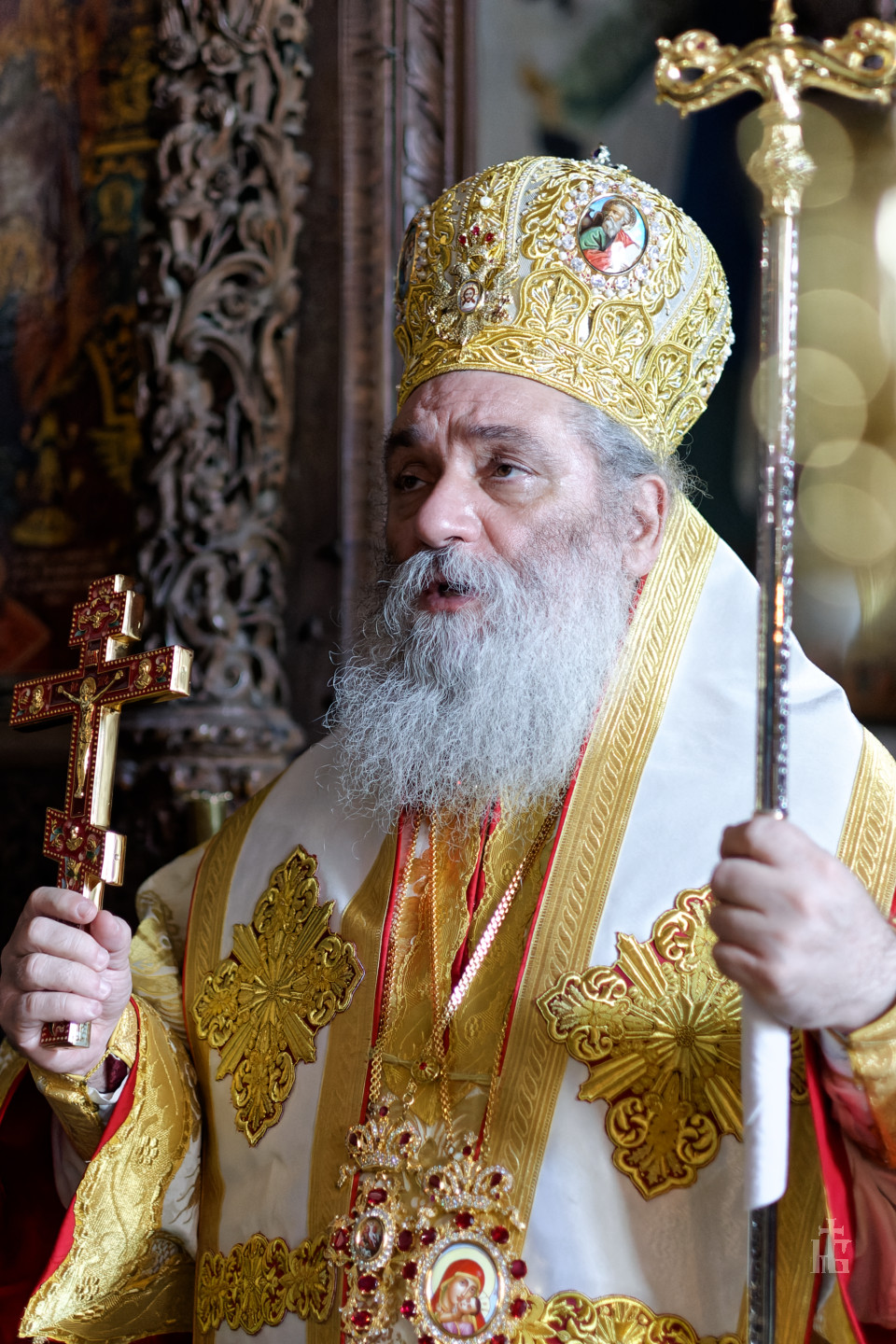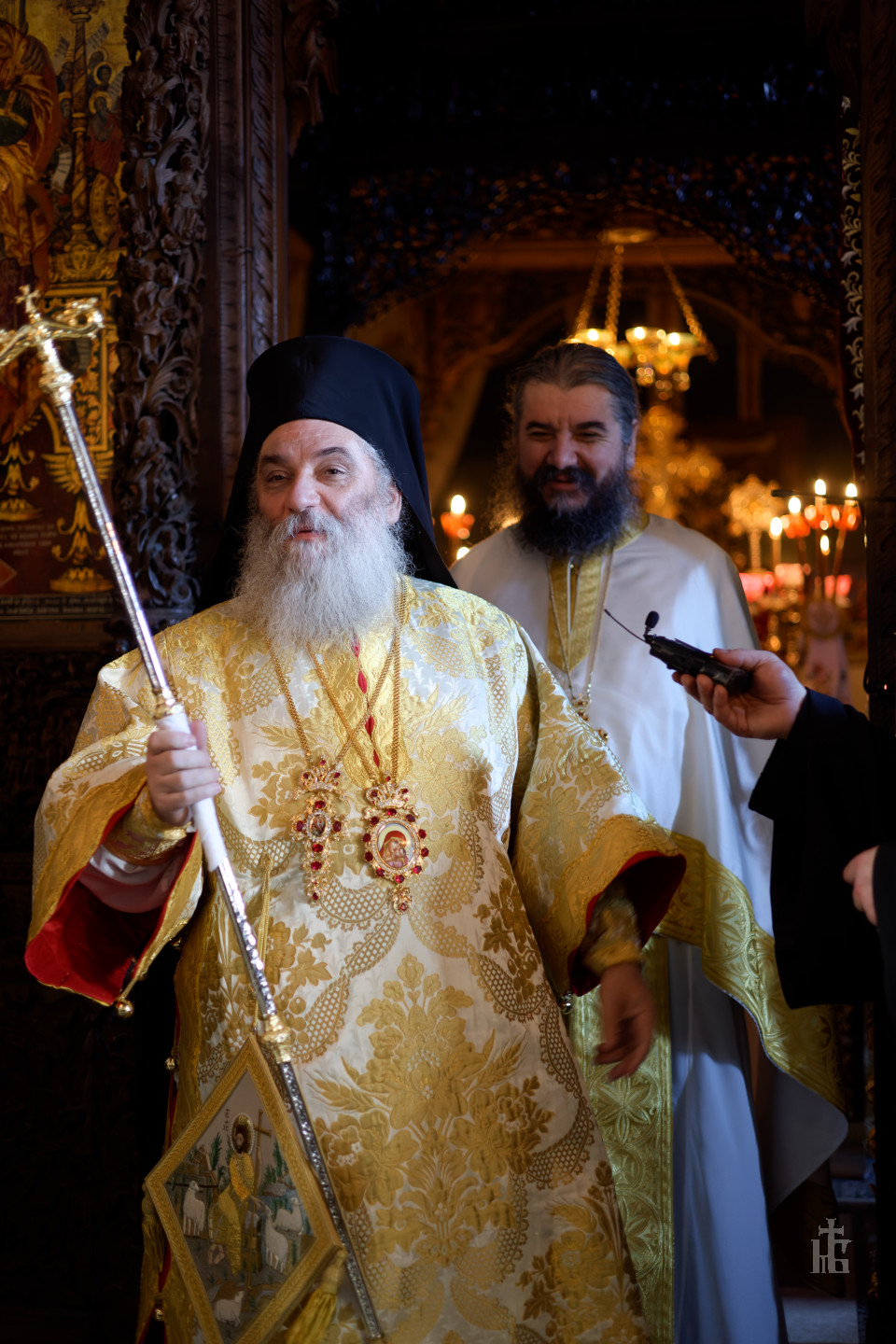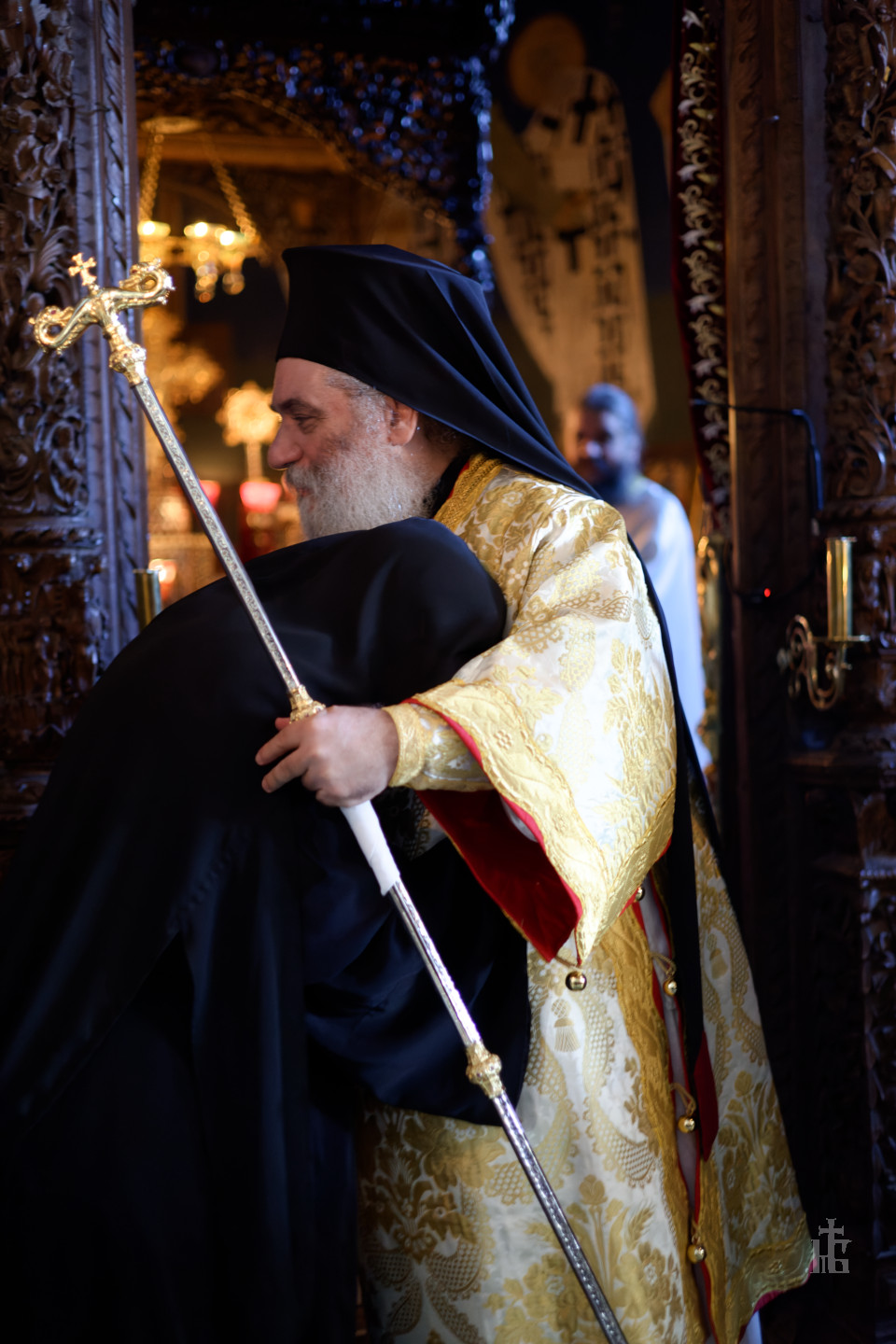A Homily by His Grace Bishop Parthenius of Antania, delivered at the Divine Liturgy on the Sunday of the Prodigal Son, February 19 / March 3, 2024, in the year of our Lord
In the name of the Father, and of the Son, and of the Holy Spirit!
We have just heard, my beloved ones, the Parable of the good father and his two sons, spoken from the lips of the Son of God. It is recounted in the fifteenth chapter of the Holy Gospel according to Saint Luke. This chapter begins with the description of two opposing attitudes among the people. On one hand, tax collectors and sinners were coming to Christ to listen to Him, to delight and find consolation, while on the other hand, He was also followed by scribes and Pharisees, the leaders of the people, who were there not to learn but only to resent and condemn Him for sitting and eating with harlots and sinners. In response to the malicious thoughts of these latter, the Lord began to speak in parables, that is, stories. First, He told the Parable of the Lost Sheep, then of the Lost Coin, and finally, of the Prodigal Son. The Parable of the Prodigal Son.

It could be said, my dear ones, that in the personas of these two sons, the entirety of humanity, all its history, is reflected. Both represent man fallen away from God. For the younger son, this is more than obvious. He takes half of his father’s estate and departs to a foreign and distant land, far from home, where he recklessly squanders his inheritance, living sinfully and licentiously with harlots and sinners. Yet, as paradoxical as it may seem, we cannot say that the elder son was right and truly close to his father as it appears at first glance. Though he remained in his father’s house, his resentment against his brother’s return shows that he did not have the spirit of his father; he was not spiritually close to him. From the history of the Holy Scripture, we know that only one nation had preserved the revelation of the one true God – the Jewish people. All other nations had fallen away from God like the prodigal son, gone far from the truth, into the foreign land of idolatry, where they worshiped and enslaved themselves to creations, not the Creator. Therefore, right from the beginning of the Bible, two categories of people are mentioned: the sons of men, who completely erred and strayed from the true revelation of God, and the sons of God, i.e., those who still kept the tradition of Adam, that man is created by God and for God, and that his existence’s purpose is to return to God, to live in communion with Him. Then, the sons of God were forbidden to associate and unite with the sons of men, so that they would not defile their memory of Paradise and the Creator, gradually and entirely forgetting Him. But they did not keep this command and began to mix with the others, thus provoking God’s disciplinary rebuke that followed. Yet here, too, God’s patience was shown. Namely, the long-suffering Heavenly Father chose the heart of the righteous Noah and found it worthy to address the people through him, warning them that they need to wake up, amend, repent, abandon their evil deeds and malice, and come to their senses, lest they provoke a universal cataclysm. And so, by the immeasurable mercy of God, the construction of the ark by the prophet Noah lasted a for a hundred years, an entire century, so that people would have as much time as possible to repent. But, alas, the years passed, and no one among the people took the prophet’s call to repentance seriously. The sons of men, the prodigal sons, were so spiritually blinded that they could neither recognize God’s mercy nor the impending danger. And the flood came, and so the entire old world perished.
But even after the renewal, humanity found itself in constant lament due to its distance from God. It seems there was no man who did not feel this immense spiritual sorrow. Even the righteous sighed with soulful anguish and on behalf of the people of God called upon God’s mercy. This can be strongly observed in the cry of the prophet and king David: I am counted with them that go down into the pit: I am as a man that hath no strength: Free among the dead, like the slain that lie in the grave, whom thou rememberest no more: and they are cut off from thy hand… Shall thy lovingkindness be declared in the grave? or thy faithfulness in destruction? Shall thy wonders be known in the dark? and thy righteousness in the land of forgetfulness? (Psalms 88:4-5, 11-12).
And the time came, my beloved, when God once again embraced humanity. The Heavenly Father embraced the misled and estranged man through the embrace of the Son from the Cross. Today’s parable illuminates precisely that Divine embrace for misled humanity. The learned leaders of the Israelite people resented that Christ preached salvation for all people and nations alike, unable to understand and accept that God lovingly cares for all and wants to embrace and save all. Those who know Him and pray to Him, but even more those who are misled, who need to return to Him. In any case, both categories of people, represented through the two sons, are in a dire state. Although it initially seems that the elder son remained in obedience to his father, later it becomes clear that he expected a reward for it, worked for gain, not with unconditional love. And most grievously, from the parable, it is not clear whether he returned to the house or remained outside, angry at his father.
This shows us, my beloved, that we all lack God. And to a great extent! The human soul constantly seeks and yearns for God. And here lies the tragedy, for often, in seeking the embrace of the Lord, we are misled and wander to the wrong places. We are completely deluded when we think and hope to find peace and joy, consolation and sweetness in places and through ways apart from God. Yes, we need God’s embrace, but we should not seek it in an unblessed, wrong way.
Yesterday, with a group of faithful pilgrims who came to the Monastery, we discussed the problems and temptations, which the modern man faces and concluded that today’s world is in a very difficult and spiritually ill state. Among other things, we talked about the Western European countries, which until recently were considered the cradle of a progressive civilization. And what laws are passed there today! Initiatives are promoted and propagated that aim to demolish the entire cultural and spiritual heritage of Christianity, upon which Europe itself is founded. Naturally, we concluded that the only solution is Christ. There is no other way except to come to our senses, to return to God. For, misusing the freedom that the Creator has given us, we become slaves. Therefore, today’s epistle from Apostle Paul teaches us: All things are lawful unto me, but all things are not expedient: all things are lawful for me, but I will not be brought under the power of any (1 Corinthians 6:12). From the parable, we see that the son had freedom before his father. And when he demanded the estate – which was not even his! – the father did not say anything but silently sent him to where he wished to go. What is it that God gave to man, sending him into the world? Free will, rationality, reason, dominion, the privilege to be king over all creations, and to be able to advance in every sense. Man, however, misused all this, becoming a slave to soulless passions and the master of this age, the devil. This is what is indicated in the parable: And he went and joined himself to a citizen of that country; and he sent him into his fields to feed swine. And he would fain have filled his belly with the husks that the swine did eat: and no man gave unto him (Luke 15:15-16). He became a servant who fed pigs, that is, sold himself as a slave to a harsh and inhumane master. When a man gives himself over to passions, without any control, without spiritual struggle, without abstinence, he inevitably becomes their slave, for he can satisfy them with nothing in this world. And so, the son was utterly hungry. For, nothing in this world can satisfy the human soul, which is at the same time divine, created in the image and likeness of God, for eternity, for filial communion with Christ. Man’s place is to be with God, and his whole aim is to become deified.

Indeed, if man does not come to his senses, does not return to God, then this world, as stated in the Parable, becomes for him a foreign and merciless land; a narrow and dark place to live, where God’s love does not thrive. We all notice this in our daily lives. We see it, unfortunately, even in the Church. Among people who may regularly go to the church but judge and are merciless, similar to the elder son from the parable. They do not sincerely rejoice, when one of the misled and great sinners returns to God. On the contrary, they even hinder the repentance of others, by constantly judging and slandering, in their self-righteousness, like the scribes and Pharisees who followed Christ, not to be in communion with Him but to tempt Him and to show how much they know, how smart and versed they are in the Holy Scripture and God’s Law. And today we have such a category of believers for whom the Church is only a battlefield to show their supposed zeal and knowledge. And towards the others condemnation and boasting with canons and quotes. They have read something and immediately become preachers, using social networks to bring only confusion and scandal among those who are yet to return to the Father. It is very sad when a person enters the Church without true repentance and humility. That is why today’s parable, preparing us for the Honourable Fast, calls us to come to our senses. To look deeply into ourselves and to see our own powerlessness and sinfulness. And when a man examines and recognizes himself in humility, repentance immediately follows. The soul bursts with the prayerful cry: Father, I have sinned against heaven, and before thee, And am no more worthy to be called thy son: make me as one of thy hired servants (Luke 15:18-19). Then everything begins to fall into place. Repentance comes, enlightenment comes. Just as the prodigal son wished to return to his father’s house, the merciful father immediately ran to meet him. He embraced him and took him to himself, without uttering a word of rebuke. Then he commanded the servants to dress him in fine, new clothes – which symbolizes holy baptism, but also repentance, taking the old man off and putting on Christ; then he put a ring on his hand, as a symbol of sonship and fidelity, and sat him down with himself at supper. The father slaughtered the fattened calf to feast his repentant offspring. Just as God the Father sacrificed His Son for the salvation of lost man. And now we are all called to that Divine supper, to the Divine Liturgy. With repentance and humility, we sit at the Lord’s table as God’s sons. And the Heavenly Father rejoices with all His sons, with all of us, and grants us His immeasurable and unspeakable glory.
Let us pray, my beloved, that the good Heavenly Father gathers to Himself all His misled children, both us, who are already coming to the temple, but also all those as well who are still ignorant of Him. Thus, granting us all effective repentance, so that we may be together in His parental embrace, at the supper, where the Divine food awaits us, which is a pledge for the future and the Eternal Kingdom.

Today, we also celebrate a great Saint of the monastic order, namely Saint Dositheus, who lived very briefly but remained an immortal example of monastic obedience. His life is described in the book with the teachings of Abba Dorotheus, and it is an extraordinary monastic read, which I especially recommend to every novice in monasticism. Namely, it was the first book I read when I went to Mount Athos. There I encountered the life of Saint Dositheus and his miraculous obedience unto death. Precisely for that reason, our brother Dositheus, the monastery’s steward, received that name. Inspired by his obedience, with which he resembled Saint Dositheus from the very beginning as a young novice, I decided to give him his name. And to this day, he is truly such, obedient unto death and an example for all monks – he is the first to come to services, never talks back to his spiritual father, and about him, I say that sometimes he is my eyes and my ears. When I send him somewhere, I am at peace and know that everything he hears and sees will be faithfully relayed to me as if I had been there myself. He does all this for the good of the monastery and the brotherhood. He cares for the brothers equally as for me, and therefore today, with joy and best wishes, I congratulate him on his name day, wishing him to have always the attitude that the prodigal son from the parable had, who returned with repentance to his father. All of us should be such, if we sin and we constantly do, we need to immediately come to our senses, run into the embrace of the Father. Many years, Father Dositheus!
Today, our sister Philothea, who was honoured to bear the name of Saint Philothea of Athens, also celebrates. She came along with her sisters, so that all together they could partake in this prayer assembly. May you live long and healthy, and may Saint Philothea always protect you, so that you could endure to the end in the asceticism to which you have vowed. Many years to come!
















